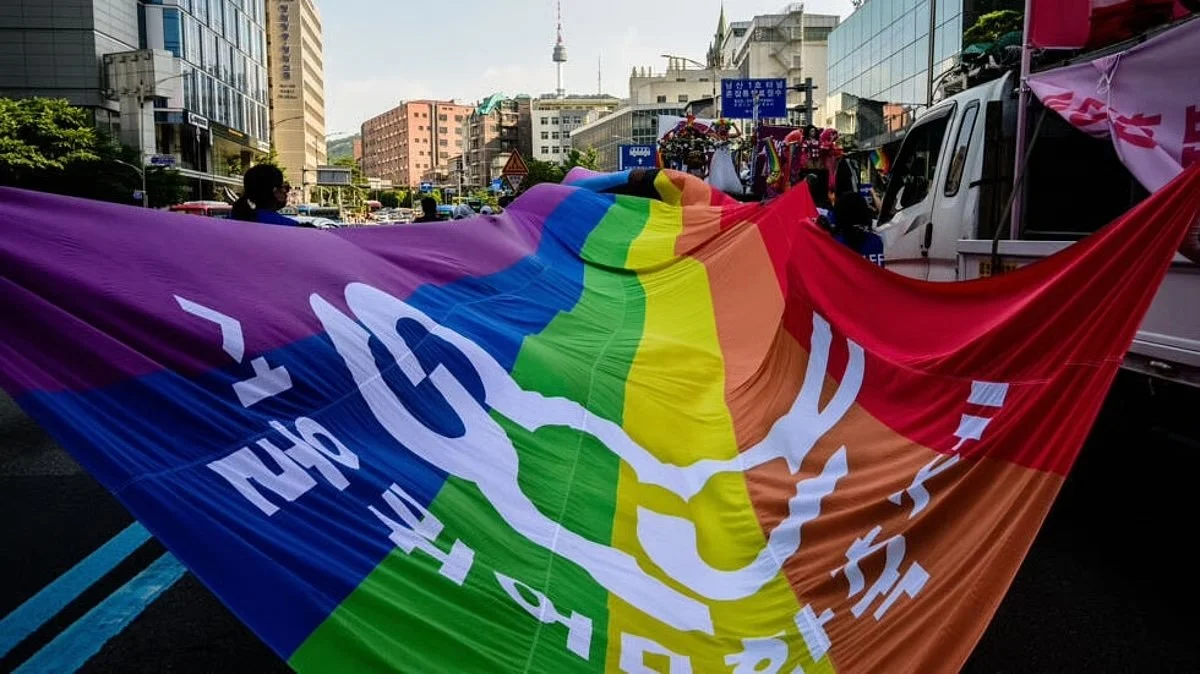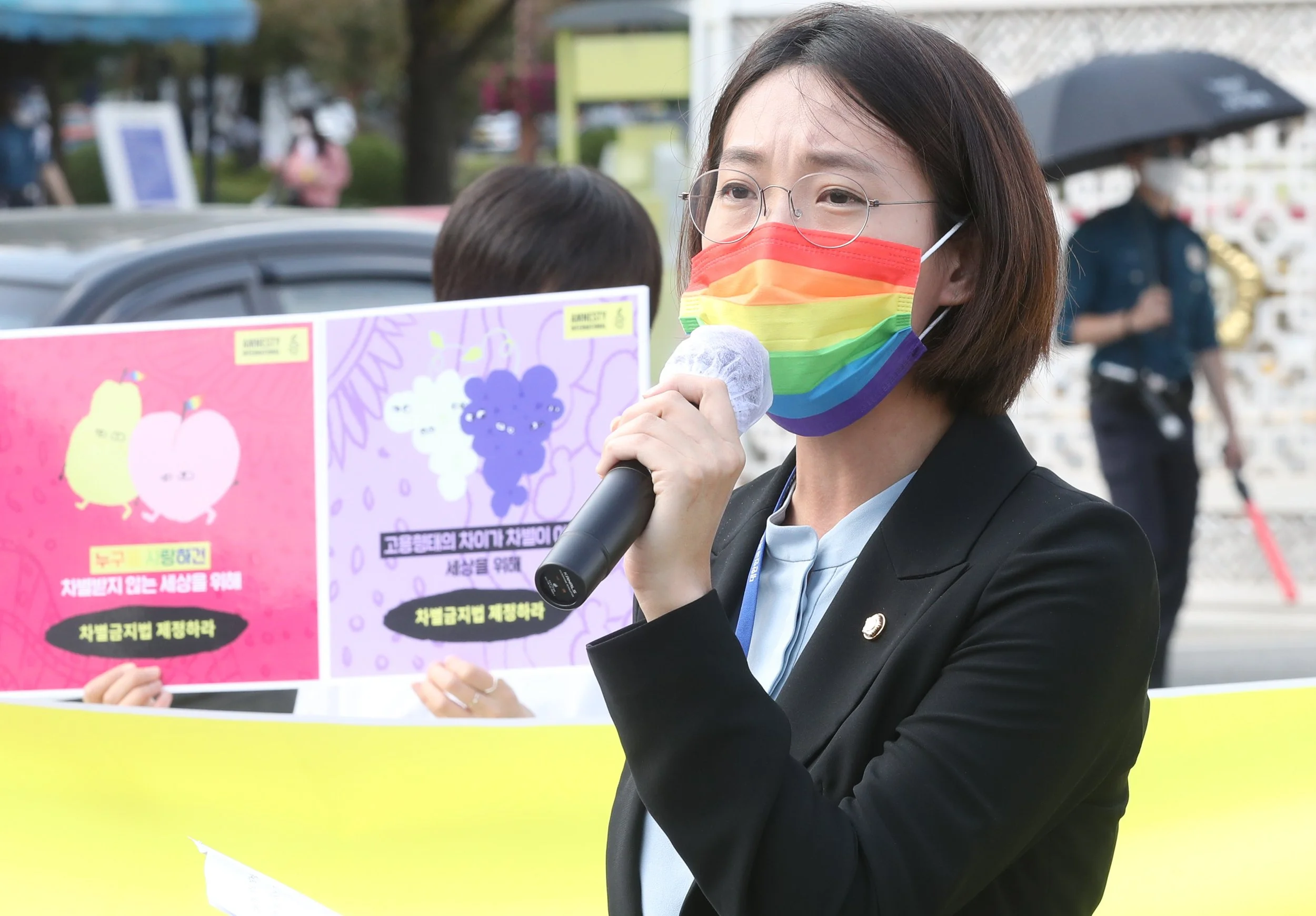LETTER FROM THE EDITOR - VOL. 13
KCCNYC Monthly - June 2025
By Eun Byoul Oh
Happy Pride Everyone!
It’s June and this month we take the time to celebrate members of the LGBTQ+ community in KCCNYC. We see you, and hear you, and we appreciate all of you in our community.
Seoul Queer Culture Festival’s Rainbow Flag.
As I mentioned in last month’s Editor’s Note, I was able to participate in Seoul Pride last year. I saw the rainbow flags everywhere, and it was one of the key moments of my trip to Korea.
Despite the sociopolitical climate of Korea which is, sadly, still not very favorable towards the LGBTQ+ community – what I witnessed from Seoul Pride Festival was that the LGBTQ+ community is on the frontline of social changes in Korea.
In fact, the members of the LGBTQ+ community were the most fierce forces in the impeachment protests, which led to the removal of Yoon from office. Further, the LGBTQ+ community is actively rallying for the rights of the disabled and labor unions—calling for social changes to adhere to human rights standards.
Deservedly, the issue surrounding the LGBTQ+ community was part of the Presidential Election, which was just held on June 3. Specifically, the Anti-Discrimination Law, known as 차별 금지법, was yet again brought up during Presidential debates, and one candidate from Democracy Labor Party (previously named the Justice Party) ran on a platform to pass the Comprehensive Anti-Discrimination Law. The Democracy Labor party also had rainbow signs up to show their support for the LGBTQ+ community in Korea.
While I am well-aware of how contentious the Anti-Discrimination Law is in Korea, I felt a bit disheartened at how the major candidates of this election have shied away from the Anti-Discrimination Law. I will use the Editor’s Note to talk about the Anti-Discrimination Law of Korea briefly, but I would suggest that everyone read the history of the bill that has been languishing on the floor of the Korean Congress for the last 17 years. The latest attempt to pass it, led by former Congresswoman Jang Hye Young from the Justice Party, failed.
South Korea has legislated previous anti-discrimination laws that cover some parts of social minorities, such as the 2007 Anti Discrimination Against Remedies for Persons with Disabilities Act. In addition, The Korean Constitution clearly recognizes the equality between genders, freedom of religion, and the right not to be discriminated against based on social class. However, the Constitutional Court ruled in 2000 (Case number 98 Heon Ma 216, (헌재 2000. 6. 1. 98헌마216) that the equality clause of the Korean Constitution does not prohibit the discrimination based on “reasonable grounds.”
Former Congresswoman Jang Hye Young at a press conference in 2020, urging passage of comprehensive anti-discrimination law.
As I am writing the article, I cannot help but also say in my head, “What is the point of saying all Koreans are equal when the interpretation of the law rules that it would not have the means to protect social minorities from discrimination?” I mean, is it “reasonable” that I would not be able to access a venue because I use a wheelchair? The answer appears to be, “maybe”.
The current “partial” Anti-Discrimination Law serves social minorities to a certain degree, but do these laws really protect disabled people, or women, or LGTBQ+ people? It remains certainly questionable. Discrimination against people with disabilities, against women, against LGTBQ+ persons and people of different races and ethnicities face discrimination on a daily basis. The UN and Amnesty International urge the South Korean government to take measures to meet International Human Rights standards.
The Comprehensive Anti-Discrimination Law bill has been put on the floor of Congress as a remedy for the current shortcomings of the anti-discrimination laws of Korea. The Comprehensive Anti-Discrimination law enables social minorities to have the grounds to legally protect themselves to a greater degree, including discrimination based on race, ethnicity, and sexual orientation. Nevertheless, the bill has never passed, and the many people say the most controversial aspect of the bill has to do with the rights of LGBTQ+ community.
It just hurts me when I think about how the dissonance around the Comprehensive Anti-Discrimination Law in Korea maybe demonstrates how people want to “justify” their “rights” to discriminate against others. I think it is really time for Korea to move forward, to move on from its complacency that it has become the powerhouse for K-culture with global audiences. It really needs to have a reckoning that if Korea and Korean culture want to be welcoming towards the global audience, Korea will have to fully embrace diversity.
On that note, this month is dedicated to our students in the LGBTQ+ community, and our team covers the recent Presidential Election. In ‘This Month in History’, we cover the June Uprising, which finally brought direct and free Presidential Elections to Koreans.
Lastly, we thank everyone for joining us for our Monthly Book Club, Dosan Hakdang, for the months of May and June. The recap for the May book club is released in this volume, and the June Book Club, with author Bora Chung, will be covered in the July Issue. Please stay tuned for the July meeting announcement.
As Korea is starting a new chapter in its history with a new leader, I pray for more changes to come in the near future, for a Korea that is safe for everybody.
With Love,
Eun Byoul Oh



